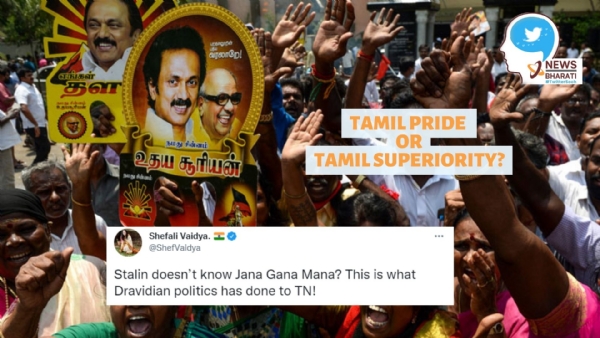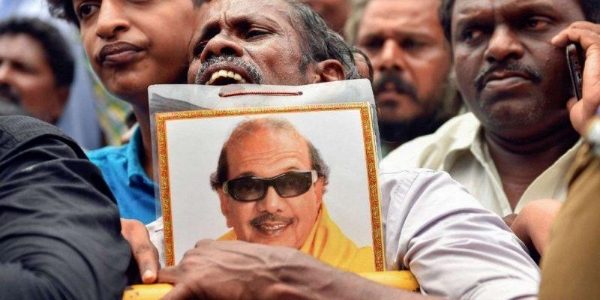#JanaGanaMana : Tamil Nadu CM Stalin's ignorance to other languages makes him stand silently for national anthem
During the inaugural event of first ever Chess Olympiad, Tamil Nadu CM MK Stalin"s actions mirrored the impact of ignorance to other languages among Tamilians, rooted to the phenomena of "Tamil Language Superiority Complex".
Total Views |
A video of Tamil Nadu Chief Minister MK Stalin is making rounds on social media, where during the inaugural program of Chess Olympiad, in the presence of Prime Minister Narendra Modi, when the national anthem is played, the Tamil Chief Minister is seen standing silently, not uttering a single word of the national anthem. His actions has resulted netizens to question the reason behind it and considering the ideological background of Stalin and his political party; Dravida Munnetra Kazhagam (DMK), the video is being linked with the subject of 'Tamil Language Superiority Complex' on twitter.

PM Narendra Modi declared open the 44th Chess Olympiad at JLN Indoor Stadium in Chennai on Jul 29 and welcomed all the players and chess lovers from around the world to India. During the inaugural event of first ever Chess Olympiad, Tamil Nadu CM MK Stalin's actions mirrored the impact of ignorance to other languages among Tamilians, rooted to the phenomena of 'Tamil Language Superiority Complex'. MK Stalin standing silently for the national anthem, without uttering even a single word of the national anthem has brought the issue to forefront.
The story of 'Jana Gana Mana'
The National Anthem of India entitled ‘Jana Gana Mana’ was originally composed in Bengali by Rabindranath Tagore in 1911. The original song composed by Tagore that became the inspiration of the national anthem we sing today was ‘Bharoto Bhagyo Bidhata’. The original song ‘Bharoto Bhagyo Bidhata’ is a Brahmo hymn which has five verses. Out of the five, only the first verse has been adopted as National Anthem. The 'Jana Gana Mana' we sing today is the Sanskritized version of the original Bengali composition.
Tamil Language Superiority Complex or just proud of Tamil culture?
Tamils are well reputed about the pride they attach with heir culture, rituals, traditions and language. There's definitely nothing wrong in feeling proud with out own culture. In fact, that is what the national anthem stresses the most on; 'the socio - cultural diversity of India'. Its a phenomena observed in every region of the country. But when we talk about the same in case of Tamils, it is obvious that the intensity of 'pride' certainly rises to serious extent. The reason of this perception is what has been propagated through their actions as a community. And the recent actions of Tamil Nadu CM MK Stalin has further justified this social perception of Tamilian pride.
Of course, there is not problem in feeling proud of your own culture but all these regions across India, that have diverse culture, are all united with a thread of nationalism. However, it becomes a problem for the entire nation when this pride exceeds the feeling nationalism. This results in creation of a separate identity of the region that becomes more important to the local people than the country.

This kind of environment itself is absolutely appropriate for separatist elements to divide the land from mainland India. Kashmir, has already been a big lesson for India. This is exactly when the aspect that is stressed up on through the national anthem comes in picture, 'Unity in diversity'. Unless and until such sentiments of regional superiority exist among countrymen, 'Unity in diversity' will remain a dream for the country.
Although several Tamils acknowledge that the extent of pride among them for their language and culture has never exceeded that of the nation, but at least it has been perceived so across the nation. The Tamil political representation can definitely be counted as one potential reason for this perception to have developed. And actions like that of MK Stalin's certainly explain why.



